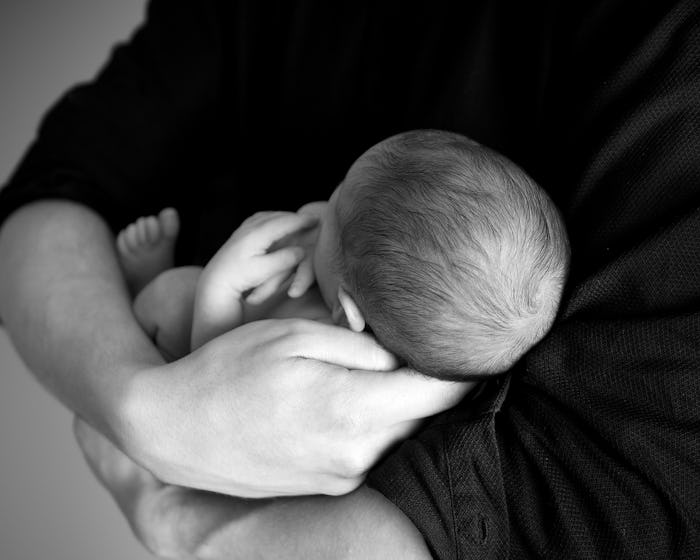As soon as you become a parent, you realize that no amount of books or advice from fellow parents could prepare you for what it's like to actually be responsible for another human. And no matter how much help you have, sometimes you're left to your own devices. Interpreting your baby's noises can be a difficult process, especially when it comes to those noises other than crying. (And let's be honest, crying is difficult to decode to.) Yes, that's right, you can learn how to interpret baby burps, because they actually mean something.
Rather than writing off your baby's burps as simple gas or as a post-feeding necessity, delving into the world of baby burps — why they sound the way they do, and why they occur when they do — can really help you read into what your baby's body is telling you, even further. When gas bubbles get stuck in your baby's stomach, it can cause them discomfort, which can often cause them to squirm or cry, according to Parents. And a burp helps release those gas bubbles through the esophagus, relieving your baby of their discomfort.
According to the American Academy of Pediatrics, you should burp your baby regularly, even if your baby doesn't show signs of discomfort or release any gas when you burp them. This is a sort of discomfort prevention technique for your baby, because the gentle rubbing and tapping on your baby's back can help settle their stomachs, even if they don't physically burp.
But what about when they do burp? When it comes down to it, there are three general reasons your baby might be burping, and they're all thanks to those pesky gas bubbles. The most common reason, is because they're swallowing too much air. When babies are nursing or drinking from a bottle, it's inevitable that they swallow some air along with their milk or formula. "This happens more often with bottle-fed babies, who tend to eat faster," pediatrician Dr. Erika Landau told Parents. "But breastfed babies swallow some air as well, especially if the mother has a lot of milk or has a fast letdown, or if the baby is very hungry and wants to eat fast."
Aside from gulping down air while eating, the actual digestion of what they're eating can cause your baby to burp as well. The National Institute of Diabetes and Digestive and Kidney Diseases reported that the breakdown of certain foods in your intestine by bacteria can naturally create gas, and the same goes for babies. Since dairy can often cause gas in both adults and children, it's no surprise that babies may be burping due to the way they're digesting and processing
Last, but certainly not least, you baby could be burping due to what you're eating. Because babies can get gas from not only the food they consume, but the food their mother consumes as well, the chances of babies having gas from the breakdown of what they're ingesting is even higher, and can sometimes be tricky to trace. According to the National Institutes of Health, some of the most common foods that can cause extra gas during digestion are beans, broccoli, cabbage, sugar-free candy, and carbonated beverages, and many, many more. If your baby is continually struggling with gas and discomfort while you're breastfeeding, you may want to take a look at your own diet and see what you can change to help soothe your baby. And if you're formula feeding, it may be time to check out a new formula that's easier for your baby to digest.
